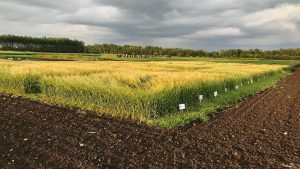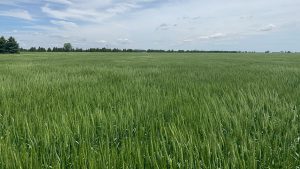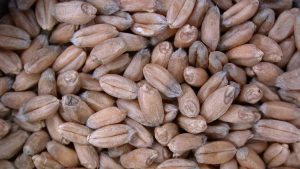Adapting
FROM THE CEO'S DESK

IT’S BEEN NEARLY six months since the COVID-19 pandemic changed the way we do business and interact with each other. During that time, we learned just how capable we are of adapting to changing circumstances; but we also discovered a few challenges that weren’t wholly unexpected within an industry with long production cycles.
As an organization, Grain Farmers of Ontario continued to operate with staff working remotely from home. We embraced technology that allowed us to maintain our interactions with each other, our farmer-members, and the general public.
The pandemic forced the cancellation of numerous events we take pride in supporting every year. Our Grain Discovery Zone events trailer remained in storage for the summer for the first time since it was launched in 2013. When possible, we provided alternative materials or on-line resources for fairs hosting virtual events. We focused on adding additional content to our Good in Every Grain website in order to reach families looking for recipes or activities to do with their children while everyone stayed at home.
Fostering connections through social media isn’t the same as having a one-on-one conversation with a consumer; but with the Canadian National Exhibition and the Royal Agricultural Winter Fair already cancelled, we will continue to embrace opportunities to support local fairs and events however possible this fall. We have already seen a tremendous response to our online posts and positive engagement around the use of grains and we will continue making these successful connections.
We also utilized technology to conduct business with our Board of Directors. They successfully reviewed and approved a budget for our new fiscal year. We increased our communication to farmer-members to let them know about available resources that could support them and their businesses if they were struggling with their operations, human resource needs, their physical health, or their mental health.
However, there are some things that can’t be changed overnight. We saw evidence of this in our agricultural supply chain. Consumer habits shifted rapidly — but our food supply system isn’t designed to adapt that quickly. We have a well functioning system — one that ensures safe, quality food makes its way onto grocery store shelves. We also quickly realized that consumers are not always aware that even if there is food on the shelves, that doesn’t mean that there isn’t a disruption along the way.
This spring, grain farmers planted their crops; and this fall they will harvest them — something many of our farming families have done for generations. But this year, there is a lingering uncertainty that has been created by COVID-19. The global marketplace has changed. Our domestic supply needs have changed. These shifts in demand are impossible for farmers to adapt to within a single growing season, after seed has already been purchased and planted in the ground.
Many governments around the world prioritized farmers and domestic food production by supporting their farmers and helping them take the risk of planting in this uncertain season. The U.S. is perhaps the strongest example of this with a $36 billion support package for the agriculture sector — which includes $16 billion of direct support to farmers and ranchers for actual losses as a result of price and market supply chain impacts such as lost demand or market over-supply.
Here in Canada, the government has largely ignored the needs of grain farmers while asking them to take on more and more risk to produce an essential product. That is why Grain Farmers of Ontario launched our campaign to make the federal government aware of the need to support the grain sector the same way they were providing targeted support for other sectors of our economy. We have a simple, logical request: improve business risk management programs to offer grain farmers the assurance and security they need to carry on.
Farmers can adapt to changing market demands — but it takes time. Agriculture will play an important role in our country’s economic recovery from COVID-19. Grain farmers are doing everything within their control to produce food for Canadians and maintain their link within the supply chain. Federal and provincial governments need to recognize they have a link in the chain as well. We are optimistic this will happen as every Canadian depends on it. •

























